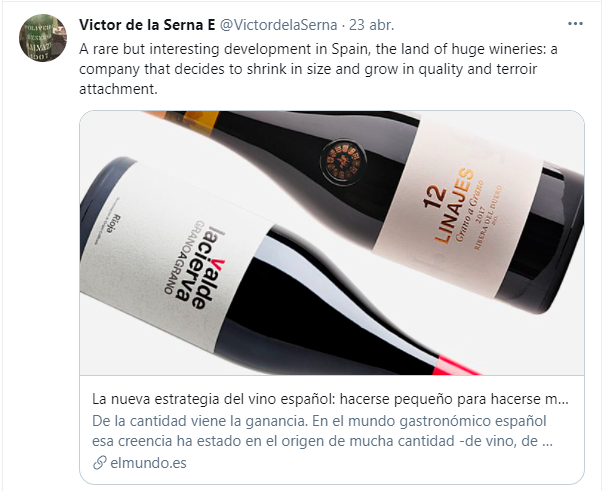
More is better. In the world of Spanish gastronomy, this belief has helped generate large quantities – of wine, of olive oil, of ham….- but it’s also to blame for a lot of mediocrity. We’ve discussed the tendency on these pages on several occasions, alongside the countermove away from mass production and towards making less but of higher quality; discarding more industrial processes to focus on the artisanal.
Scarcely a month ago, we reported on the complaint from the small producers’ association, Family Wineries of Rioja (Bodegas Familiares de Rioja), highlighting the fact that that over the last ten years, 53 wineries and almost 3,000 winegrowers (DOCa Rioja) have disappeared, ¨thanks to policies which prioritise quantity over quality, an excessive bureaucracy, and a lack of institutional support for the family business model.¨
It’s true: small businesses don’t get much support, but all over Spain the ones that are surviving – and not just through this year of pandemic, when wine sales in Spain have fallen more than in any other country thanks to such a high reliance on sales to the hospitality sector, which has been closed pretty much everywhere – are doing so precisely because they are focused on quality and authenticity.
Another, perhaps even more challenging path, is that of large winery groups which decide to shrink, or downsize, in order to focus on developing more premium wines – with higher value added – from a single vineyard, or smaller wine-growing area (paraje), or from very old vines and using more natural winemaking methods. A couple of years ago in EL MUNDO we took a closer look at one of these (rare) groups which deliberately sets out to narrow its focus, and we have just tasted their wines again. Theirs is an original and encouraging story which other wineries should take note of.
The group in question is Hispanobodegas, created a few years ago by bringing together the Valdelacierva winery in Rioja, Gormaz from the eastern end of Ribera del Duero around Soria, and Garcigrande from DO Rueda, and the original plan was for fairly large production of a range of mid-priced wines. Not any more, at least not in the first two wineries, although the refining process doesn’t seem to have got underway yet in Rueda.
To give you an idea of scale, between Valdelacierva and Gormaz – the former wine cooperative in the village of San Esteban de Gormaz, privatized in 2004 – the group has more than 400 hectares under vine. Bigger is best, as they like to say around these parts: with that amount of vines planted, at a conservative estimate, if it wanted to the group could produce over 3 million bottles every year across the two regions.
Another important factor in the company’s makeover has been the conscious decision to avoid 1990s, or Parker-style wines which have had so many supporters and practitioners, especially in Ribera del Duero. The reader will know what I am talking about: wines like luxurious soups of oak. Instead, the team have carried out a detailed study of their excellent viticultural heritage to help identify the vines with the best potential for making refined wines packed with personality: through close study of soils and orientation, careful blending of grapes in modestly-sized cuvees or, in some cases, wines made from grapes from a single parcel.
A couple of years ago when we first tasted the wines, there were fewer single plot bottlings but now, with the new Rioja rules in place, the winery has registered ten Single Vineyard wines (Viñedos Singulares, although Hispanobodegas prefers the term únicos, or unique), which they are beginning to sell in unusually limited batches of 1,000, 2,000, or 3,000 bottles.
The Valdelacierva winery, based in Navarrete, has its prize sites in the Sonsierra and Rioja Alavesa but has also added some parcels of old Garnacha vines in Tudelilla. Gormaz, in the highest, coldest, most easterly portion of Ribera, has its key vineyards in and around villages like Atauta, Alcubilla de Avellanada which are beginning to acquire a reputation in wine circles.
Women, who thanks to their recognized sharper sense of taste and smell are playing an increasingly important role in the development of Spain’s vineyards and wineries, play an important role in this company. Two of them, Raquel Ruiz and the enologist Emma Villajos, hosted a tasting in Madrid the other day which showcased a broader range of the group’s wines whilst demonstrating that they have managed to preserve those welcome virtues which we discovered back in 2019: a delicate handling of the grapes (using large wooden vats and barrels), limited extraction, and used French oak to leave a more delicate imprint on the wine.
In the midst of so much negative news in the world of wine – we’ve seen reports of more than one serious situation (France) – this reencounter served as a welcome reminder of what is possible, an example of a Spanish winery consciously tacking back towards quality and terroir in the midst of a pretty rocky domestic wine scene.
From the group’s Riojan winery, I was particularly impressed by the Valdelacierva Grano a Grano, a Tempranillo from the La Botija estate in Baños de Ebro, where the grapes are destemmed individually by hand (hence the grano a grano name) to keep them whole and ensure a perfect intracellular maceration, and the refreshing Valdelacierva Montepedriza, one of the winery’s unique vineyard wines made from 85 year old Garnacha vines planted in Tudelilla. Under its 12 Linajes brand, the Gormaz winery also makes a noteworthy Grano a Grano wine with grapes from the now legendary Valdegatiles paraje in Atauta. We’ll soon also be able to buy the 12 Linajes Senda de la Estación 2019, a new wine with the finesse of a top Burgundy.
For the moment these wines are that well known, but they are well worth seeking out…
